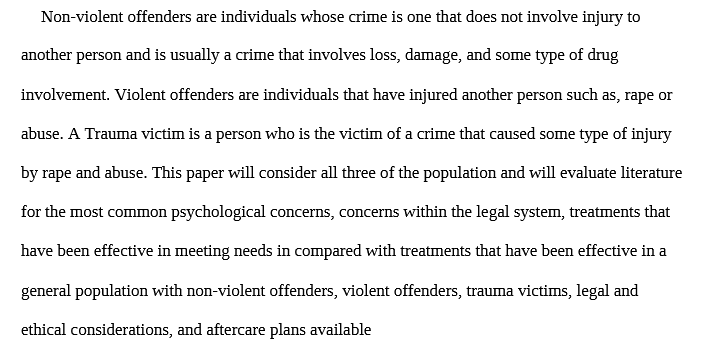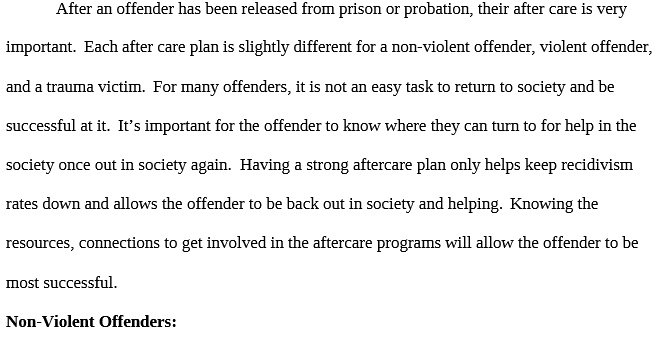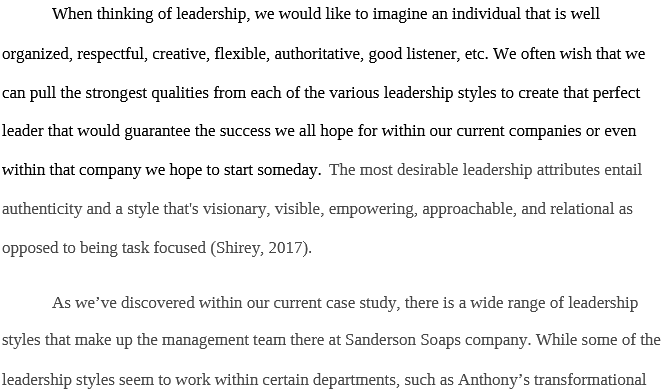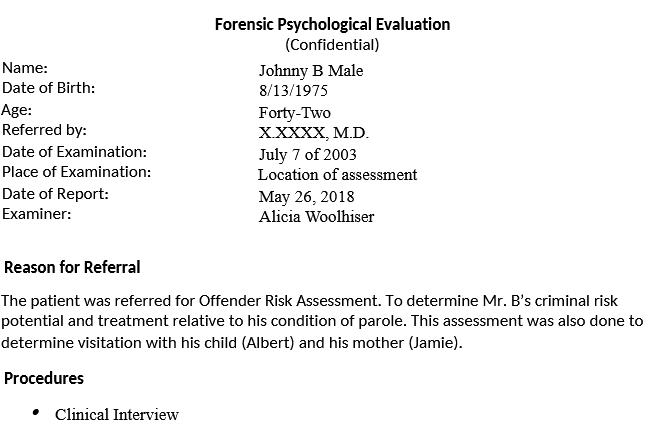PSY 624 Final Project Milestone: EVALUATION REPORT.docx- Snhu
$5.99
PSY 624 Final Project Milestone: EVALUATION REPORT.docx- Snhu
Non-violent offenders are individuals whose crime is one that does not involve injury to another person and is usually a crime that involves loss, damage, and some type of drug involvement. Violent offenders are individuals that have injured another person such as, rape or abuse. A Trauma victim is a person who is the victim of a crime that caused some type of injury by rape and abuse. This paper will consider all three of the population and will evaluate literature for the most common psychological concerns, concerns within the legal system, treatments that have been effective in meeting needs in compared with treatments that have been effective in a general population with non-violent offenders, violent offenders, trauma victims, legal and ethical considerations, and aftercare plans available Literature Review Psychological Concerns Non-violent offenders, violent offenders, and trauma victims all suffer from psychological issues some worse than others. According American Psychological Association (2014), half of prisoners have some mental health concern, about 10 percent to 25 percent of U.S. prisoners suffer from serious mental illnesses. Prisoners usually suffer from major effective disorders or schizophrenia in additions to dependence on drugs, alcohol or both (APA 2014).
Description
PSY 624 Final Project Milestone: EVALUATION REPORT.docx- Snhu
Non-violent offenders are individuals whose crime is one that does not involve injury to another person and is usually a crime that involves loss, damage, and some type of drug involvement. Violent offenders are individuals that have injured another person such as, rape or abuse. A Trauma victim is a person who is the victim of a crime that caused some type of injury by rape and abuse. This paper will consider all three of the population and will evaluate literature for the most common psychological concerns, concerns within the legal system, treatments that have been effective in meeting needs in compared with treatments that have been effective in a general population with non-violent offenders, violent offenders, trauma victims, legal and ethical considerations, and aftercare plans available Literature Review Psychological Concerns Non-violent offenders, violent offenders, and trauma victims all suffer from psychological issues some worse than others.
PSY 624 Final Project Milestone: EVALUATION REPORT.docx- Snhu
According American Psychological Association (2014), half of prisoners have some mental health concern, about 10 percent to 25 percent of U.S. prisoners suffer from serious mental illnesses. Prisoners usually suffer from major effective disorders or schizophrenia in additions to dependence on drugs, alcohol or both (APA 2014). Regarding non-violent offenders there has been a rise in community programs that decrease sentencing for nonviolent offenders and the mentally ill. According to Mental Illness and Prisoners: Concerns for Communities and Healthcare Providers by Hoke, S. (2015), Non-violent crimes found persons with schizophrenia or non-schizophrenia psychotic disorders had low rates of driving under the influence, but high rates of drug possession. Dual diagnosis was common in 74 percent of prisoners who had a mental problem along with substance abuse (Hoke, 2015).
PSY 624 Final Project Milestone: EVALUATION REPORT.docx- Snhu
Regarding violent offenders’ mental illness was not always associated with violent behaviors and that most seriously violent offenders were very well educated (Stuart, 2003). According to Stuart, H.,(2003), many determinants of violence continue to be sociology-demographic and economic factors along with substance abuse which is the major contributing factor. Regarding trauma victims because they are a victim at the hands of another person can have a lasting impact to their mental and emotional stability. Sources of trauma is usually because of violence and can be rape,domestic violence, and abuse. According to Mekhla-Chadha, S. and Malhotra, P. S., (2013),trauma victims experience symptoms of (1) cognitive responses (2) emotional responses (3)behavioral responses, and (4) diagnose able disorders like PTSD, substance abuse, amnesia,dissociative disorders and psychosis.
PSY 624 Final Project Milestone: EVALUATION REPORT.docx- Snhu
- PSY 211 – Lifespan Development (5015 Documents),
- PSY 215 – Abnormal Psychology (4335 Documents),
- PSY 108 – Introduction to Psychology (3759 Documents),
- PSY 223 – Statistics for Psychology Research (2652 Documents),
- PSY 216 – Psychology of Personality (1841 Documents),
- PSY 510 – Research Methods (1748 Documents),
- PSY 520 – Research Methods in Psychology II (1469 Documents),
- PSY 257 – Psychology (1451 Documents),
- PSY 310 – Criminal Psychology (1393 Documents),
- PSY 200 – FOUNDATIONS OF ADDICTIONS (1379 Documents),
Only logged in customers who have purchased this product may leave a review.







Reviews
There are no reviews yet.